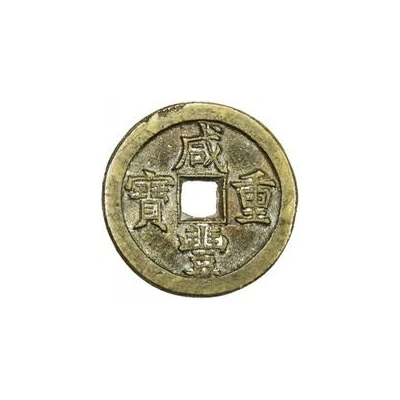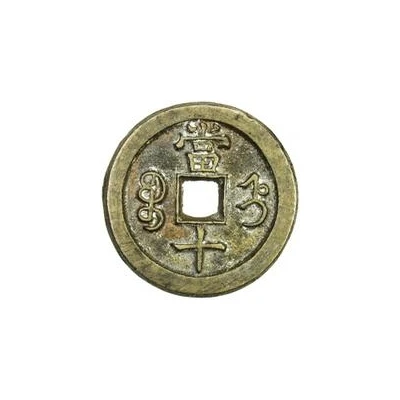10 Cash - Xianfeng Zhongbao; Boo-san; Dang Shi; large type; pattern ND
| Brass | - | 43 mm |
| Issuer | Empire of China |
|---|---|
| Emperor | Qing dynasty › Xianfeng (咸豐帝) (1850-1861) |
| Type | Pattern |
| Years | 1854-1855 |
| Value | 10 Cash |
| Currency | Cash (621-1912) |
| Composition | Brass |
| Diameter | 43 mm |
| Shape | Round with a square hole |
| Technique | Cast |
| Orientation | Medal alignment ↑↑ |
| Demonetized | Yes |
| Updated | 2024-10-03 |
| Numista | N#226181 |
|---|---|
| Rarity index | 100% |
Reverse
Two Manchu words (read vertically) separated by the hole, all with one Chinese ideogram above and one below.
Scripts: Chinese (traditional, regular script), Mongolian / Manchu
Lettering:
當
ᠪᠣᠣ ᠰᠠᠨ
十
Translation:
Dang Shi / Boo-san
Value 10 / Boo-san
Edge
Plain
Comment
These are only known as patterns.Interesting fact
One interesting fact about the Pattern 10 Cash - Xianfeng (Zhongbao; Boo-san; Dang Shi; large type; pattern) ND (1854-1855) from Empire of China made of Brass is that it was designed by a French engraver named Jean-Antoine Raux, who was hired by the Chinese government to modernize their currency. This coin was part of a series of coins that were designed to replace the traditional Chinese cash coins, which were circular in shape and had a square hole in the center. The Pattern 10 Cash coin was unique in that it featured a dragon on one side and a phoenix on the other, symbolizing the harmony between yin and yang. Additionally, the coin was made of brass, which was a more durable material than the traditional copper used in previous Chinese coins.

